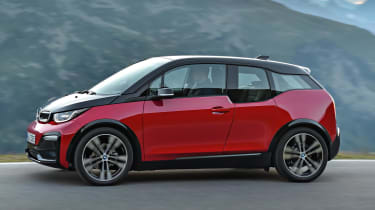BMW i3 hatchback (2013-2022) - Range, charging & running costs
If you’re after low-cost motoring, the BMW i3 takes some beating
As the BMW i3 is an all-electric model, you won’t pay a penny in fuel costs; battery charging is a fairly inconsequential cost compared to a tank of petrol or diesel. The BMW i3 remains road-tax-exempt after the first year of ownership, thanks to zero emissions. As a zero-emission electric vehicle, the i3 is exempt from the additional VED surcharge levied against new cars costing more than £40,000, which now only applies to petrol and diesel models.
In a bid to encourage more company-car drivers to choose an EV, the UK Government reintroduced the 0% BiK rate for the 2020/21 tax year for all EVs registered from 6 April 2020 onwards. It has now risen to 1% for the 2020/21 tax year and will rise again to 2% for 2022/23 but the tax benefits of running an i3 (like any other EV) are still generous.
BMW i3 range & charging
Every i3 can take advantage of DC rapid-charging facilities as standard. However, you can still enjoy the convenience of home charging overnight from a household wall socket, a process that takes around 15 hours with the standard charging cable.
The i3 doesn't produce any CO2 at all, so it's exempt from road tax and the £40,000 threshold mentioned above. The high density 120Ah battery pack (introduced in late 2018) will take you up to a claimed 190 miles before it’s time to plug in again, which should make the electric i3 more than a match for the average daily commute.
Go for the sportier i3s model and there’s precious little change in running costs or real-world range. An official range of 175 miles is quoted, but while this is less than the standard car, BMW says the real-world range is the same for both models at 160 miles. Charging takes the same time, too: it takes around 15 hours for a full charge via a mains supply, or just over 40 mins if you have access to a DC rapid charger.









